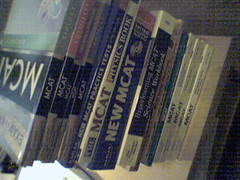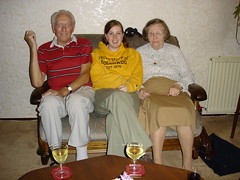On Friday I shadowed the outpatient neurology clinic, as I do once a month, and observed a days worth of follow-up visits. Most clinic days seem to show a theme - more likely because something registers in my subconscious than any trick of patient scheduling. Considering my recent review of genetics, it's perhaps not overly mysterious that this month impressed upon me the phenotypic markers that can signal an underlying neurologic process.
Most of you are probably familiar with some of the more famous neurologic phenotypes. For example, the Down's syndrome features of a single transverse palmar crease (simian crease), epicanthic eyelid fold, flattened nasal bridge, shortened limbs, proruding tongue, and white spots on the iris (Brushfield spots). The genetic correlate of Down's is whole or partial trisomy 21.
There are, in fact, a large number of genetic or neurologic processes that can be identified by phenotypic markers. An non-genetic example would be a perinatal (near time of birth) stroke patient. His stroke included part of the internal capsule and thus affected the neuronal tract that includes motor neurons. His stroke was right-sided, so one would expect left-sided motor affects. Indeed, because the stroke was not immediately noticed during his infancy (most infants do not get MRIs) his left side failed to develop properly. His left arm is shorter than his right (atrophy) and displays abnormal tone and fine motor control. In this case, the morphologic presentation of a shortened arm with abnormal tone allows a neurologist to begin localising his stoke before ever seeing an image.
A note about fine motor control - I get a lot of questions about this. Gross motor contol is large movements: walking, throwing, and lifting. Fine motor is things like tieing shoes, buttoning buttons, and writing. One test you might see a neurologist perform is asking a patient to touch their first finger to their thumb, then their second, third, and fourth. Another is to tap their first finger and thumb together as rapidly as possible.
Regarding motor development in infants... like anything else it's hardest to assess in younger children. Babies have little to no purposeful motor control so assessment usually consists of examining involuntery movement for abnormal posturing, tone or lack of movement. Mild deficits can be difficult to note until a child fails to develop on a normal timeline (ie, cannot stand independently or sit-up on time).
And now a genetic example. I should mention that this patient has not yet been conclusively diagnosed, we simply added Wolf-Hirschhorn to the differenital because of the phenotype. There were two children who came into clinic after having been neglected by their biological parents. It was impossible to tell whether they were delayed due to lack of input or whether there was genuine neurologic impairment of some kind. The children were placed in foster care and came back speaking 3 word sentences (they are 3 and 4 yrs old), but still underweight and incapable of tasks such as putting on clothing or drinking from normal cups. The younger child displayed tremors (attributed to more than being nervous because it affected her head as well) and the older child has "greek-helmet head", microcephaly (small head), and shortened stature. Greek helmet head is characterised by a high hairline and a broad, flat nose.
If the older child does have Wolf-Hirschhorn (deletion on chromosome 4) he's both lucky and unlucky. Unlucky because it's associated with fairly profound mental retardation, and lucky because his phenotype is (apparently) relatively mild. More extreme symptoms can include cardiac septal defects, poor development of secondary sex characteristics (genitals), renal (kidney) malformation, malrotation of the intenstines, and hand/foot contractures.
One of the important notes about these phenotypic varients is that in order to dianose anything they generally occur in clusters. For example, just having wide-set eyes or a high hairline doesn't mean you have a genetic defect or a neurologic symdrome. Cleft palate is a midline closure defect - a characteristic of Wolf-Hirschhorn syndrome. However, far more babies are born with cleft palate than Wolf-Hirschhorn: about 1 in 600-800 vs. 1 in 50,000.



